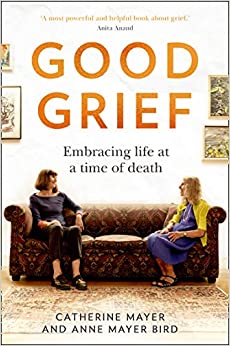It's been six months since my mother died, aged 80, in a care home, suffering with dementia. Locked inside to protect her and fellow residents from contracting coronavirus. Over those months, I have frequently wondered if how I grieve is the right way, always looking around me for clues.
How often should I cry? How much should I rest? What's an acceptable amount of time to take off work (I'm self-employed)? Should I keep myself busy? Am I keeping myself too busy? Is it too soon to say goodbye to Mum's clothes?

Given my constant questioning, I was heartened to read in "Good Grief: Embracing Life at a Time of Death," that there is no right or wrong way to grieve.
Authors Catherine Mayer and her mother, Anne Mayer Bird, who lost their husbands within 41 days of each other, gave me permission to grieve on my own terms. And in my own time. Without looking to others for answers.
It seems obvious. It is obvious. But for me, it was reassuring to see it written down. We'll all journey through grief in a different way, and that's exactly as it should be.
This isn't my first experience of losing a loved one. My father died some 14 years ago, which seems such a long time ago now. I was 30-something and single at the time, and his death shattered me.
My mother's death has, too, in different ways. We were closer, our relationship was more complex, and she was my last remaining parent. So it was a massive blow. But I'm better equipped now for such an emotional earthquake than I was when Dad died.
I'm older (I turned 50 two months after Mum died), I've already lost one parent so I have some experience under my belt. I'm also married to a supportive partner. He was by my side throughout Mum's final days and continues to prop me up when required.
I found this man later in life, marrying him when I was 48. I can't imagine life without him. So I can't imagine what Mayer and Mayer Bird went through, and continue to go through, after losing their husbands of multiple decades.
They were also bereaved just before the U.K. declared a national lockdown. They were unable to hug their nearest and dearest and only saw each other once a week, at a distance and wearing masks.
Yet this extraordinary backdrop has produced an extraordinary book, which I believe will bring comfort to anyone who's lost a loved one. More so if that loss occurred during these times of closed hospital wards, limited numbers at funerals and covered faces.
There's something powerful and healing about reading someone else's journey through grief. It helps us to feel less alone with our feelings and sometimes, it helps us to cry, which we may need to do.
I certainly felt less alone when I read some of the authors' relatable anecdotes
How they held it together through some tough times then burst into tears when the Wi-fi router broke down. How they felt moved by the kindness of strangers but hurt by the friends who disappeared, perhaps saying nothing because they didn't know what to say.
I cried too at various points, notably when I read about the importance of naming our final resting place. My Mum didn't leave us with much paperwork to do, or "sadmin" as Mayer calls it. But she did leave a simple Will, that stated where she wanted her ashes to be scattered.
Knowing her wishes and knowing that we will honor them in due course brings me some comfort. It also reminds me of the importance of putting my own affairs in order, even if I live for many years to come.
This is one of the key messages of the book: we must talk about death and prepare for it, out of love for those we'll leave behind. Will I take this on board and revise my out-of-date Will? Or will I keep putting it off, as so many of us do?
There's another vital message in this book that moved me to tears: the idea that we grieve profoundly because we have loved deeply. And that, despite the pain of losing someone, it was worthwhile.
Reading this, I feel grateful that I found the courage to love. I feel inspired to dive into the rest of life, to take risks and to walk through my fears.
I thank the authors for their courage in sharing their truth and for their encouragement to embrace life fully.
Mind Tools reviews the best new business and self-development books, and the tested classics, in its monthly Book Insight for the Mind Tools Club. So, if you're a Club member or enterprise licensee, you can download or stream the full "Good Grief" Book Insight in text or audio format.
If you haven't already signed up, join the Mind Tools Club and gain access to all 2,400+ resources, including approximately 400 Book Insights. For a corporate solution, take a look at our Mind Tools for Business site.
How have you coped with grief? What is the best advice you could give? Join the discussion, below.

"It started with an ice-breaker. I found myself face-to-face with the head of the whole company. And as I started answering the question, I began to cry, right in front of him. " Melanie Bell
Book Insight, Communication, Mental Health, Stress, Wellbeing
If burnout is the stressed and tired employee rushing from one task to the next, rust-out is their lethargic and unmotivated colleague.
One of the worst things about procrastination is that, most of the time, we’re aware we’re doing it. This self-awareness reinforces our sense of shame and promotes self-blame. And that reinforces the negative emotions that led to procrastination in the first place. It’s a vicious circle.
Katherine, your blog touched me deeply.
Last week, and old family friend lost her husband. I grew up in front of this lady and she's been friends with my mother for donkey's years. Yet, I couldn't get myself to pick up the phone and call her, because I didn't know what to say. So, last night I decided, NOW.
I called her. I apologised for taking so long to call her and then told her, "I took so long because I don't know what to say. All I can say is that I feel deeply sorry for you, and I hold you in my heart."
Her response? "My dearest child, this is the most precious call that I've received since uncle XX passed on."
This past 12 months I've also learned about grieving in your own way and time. We're not all the same, we don't process loss the same, we don't show our grief the same way.
It is true that we grieve deeply because we love with our arms and hearts wide open.
Thanks for sharing your personal experience, and also for sharing the title of the book.
Thank you so much for your comment. It is heartening to read that my blog touched you deeply. It was moving to read about the call you made and how well it was received - such a wonderful reminder of the importance of reaching out even if we don't know what to say.
Wishing you all the best with your grieving process.
Katherine